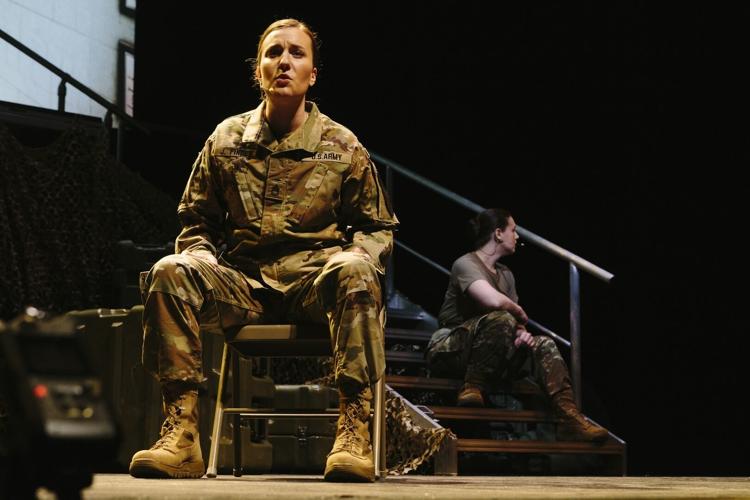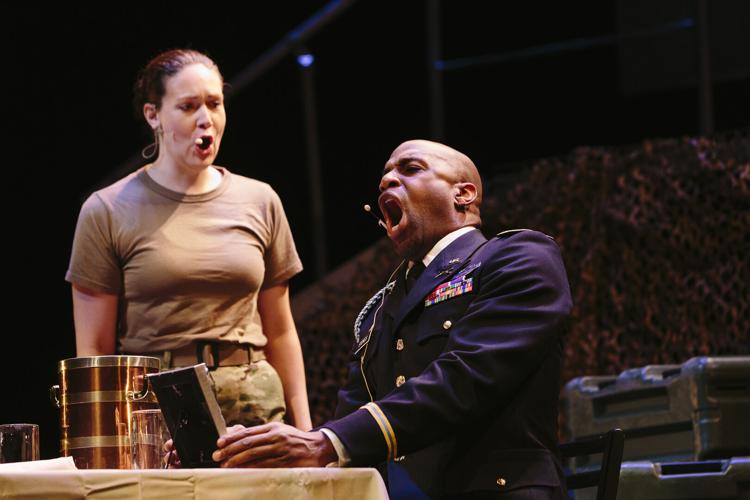Arizona Opera opened its 2022-23 season on Saturday with a new opera about the military.
“The Falling and the Rising,” the Zach Redler and Jerre Dye opera about a wounded soldier’s comatose journey to healing, could also fit into the musical theater world.
It’s both, actually.
The genius of Redler and Dye’s piece, co-commissioned by Arizona Opera and several other companies along with the U.S. Army Field Band and Soldiers Chorus, is their ability to marry opera and music theater. Redler’s score has flashes of New Orleans jazz and quintessential Broadway pop intermingled with the soaring vocals and lush orchestral melodies that define classic opera. Dye’s libretto employs soldier’s language, curse words and all, for authenticity as we peer into military life through a soldier’s lens.
Put it all together and you have a theatrical experience that appeals to opera and non-opera audiences alike.
The audience that half-filled downtown’s Temple of Music and Art Saturday night — a second performance was at 2 p.m. Sunday, Oct. 23 — included a handful of young people who seemed just as engaged in what was happening on stage as the older, more inclined opera crowd sitting next to them.
“The Falling and the Rising” opens with a lone soldier (the soaring soprano Tess Altiveros) Skyping with her soon-to-be teen daughter from the frontlines, lamenting her time away from her and pleading with the girl not to grow up so fast.
The next thing we hear is the boom and crash of the soldier’s Humvee hitting an IED; director Dennis Whitehead Darling‘s multimedia touches, with scenes of the desert projected on a giant screen and a solitary red light shining centerstage, helped us visualize the explosion.
For the next hour, we are introduced to a cast of soldier characters, each with a compelling story of their experiences:
The terrific mezzo-soprano Audrey Babcock goes by “Toledo,” a nickname from her commanding officer that stuck. She’s a loner, she tells the wounded soldier, the only girl in a family of military men whom she followed into the service and to the frontline. And while she puts on a tough facade, she’s deeply moved and impacted when her fellow soldiers sacrifice their lives during an enemy attack to save hers.
The colonel (the rich-voice baritone Thomas Cannon) who is either lamenting the loss or separation from his wife and wishing he could be there for her.
An enthusiastic paratrooper (the exciting tenor Brad Bickhardt, a member of Arizona Opera’s Marion Roose Pullin Opera Studio) who waxes poetic on the joys of jumping from an airplane and convinces the wounded soldier to take the leap.
And finally, the homecoming soldier (the soft-voiced baritone Schyler Vargas, Bickhardt’s opera studio colleague) delivers the underlying message of “The Falling and the Rising”: you can come home but it will never be the same.
The homecoming soldier sits in a wheelchair before the congregation of his church to tell them that what they see — a broken man confined to the chair — is pretty much all they can expect from him given the hand he was dealt.
That scene was straight-up musical theater, including a nod to the audience when he asks how we’re all doing today and we answered as if we were sitting in our neighborhood church being addressed by our pastor.
“The Falling and the Rising” ends with the Arizona Opera Veterans Chorus, a dozen men and women who served in uniform, joining the cast for the finale. That scene likely induced the goosebumps moment for many of the veterans in the audience.





